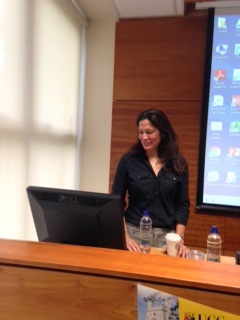In This Section
- Home
- About Us
- Research
- Research Clusters & Working Groups
- Ageing
- Children and Young People
- Research for Civil Society, Environment and Social Action (REACT)
- Genders, Sexualities and Families
- Disability and Mental Health
- SHAPE
- CARE21
- Migration and Integration
- Poverties, Social Justice and Inequalities
- Gender and the Academy Research Working Group
- Crime and Social Harm (CSH)
- Populism and the Rise of the Far-right
- Work, Organisations and Welfare
- TRANSS UCC Working Group
- News and Events
- People
- Events
- Join Us
Inter-disciplinary encounters: neuroscience, social science and the politics of research

On 5th May, the ISS21 Children and Young People Cluster, and ISS21 Disability and Mental Health Cluster, in conjunction with the School of Applied Social Studies, hosted a half day seminar exploring the relationship between neuroscientific and social scientific knowledges in the context of early intervention with children, and autism.
In a context whereneuro-scientific claims and knowledges are increasingly traversing from scientific laboratories into different fields of social intervention with complex and contradictory justifications and outcomes, the event sought to critically examine the politics and pragmatics involved in identifying research agendas and forging collaborations between neuro and social scientific fields of study.
The event hosted two international speakers who are leading researchers in the field of early intervention (EI) and autism: Ilina Singh, Professor of Neuroscience and Ethics, University of Oxford, and Dr. Steven Kapp, research fellow in sociology at the University of Exeter, on the Wellcome Trust-funded project Exploring Diagnosis: Autism and Neurodiversity. Ilina’s paper entitled ‘Early Intervention in Child Development: Promises & Perils’, explored some of the ethical and societal concerns embodied in the EI paradigm, in part through an exploration of how those subject to neuroscientific interventions themselves interpret and make sense of their ‘treatment’. Steven’s paper followed this by exploring the meaning of neurodiversity for autistic people, and examined the challenges of research agendas which are often overly-focused on finding the ‘causes’ of autism rather than providing services and supports for autistic people themselves. A panel made up of UCC colleagues from different disciplinary backgrounds, including Professor Aideen Sullivan (Anatomy and Neuroscience) and Dr. Annalisa Setti (Applied Psychology) led a lively discussion about the challenges and opportunities involved in opening up a shared neuro-social scientific intellectual space.
For more on this story contact:
For more information about the event, contact Dr. Liz Kiely, e.kiely@ucc.ie, Dr. Claire Edwards, claire.edwards@ucc.ie, or Dr. Máire Leane m.leane@ucc.ie
Institute for Social Science in the 21st Century (ISS21)
Contact us
Top Floor, Carrigbawn/Safari Building, Donovan Road, Cork, T12 YE30
